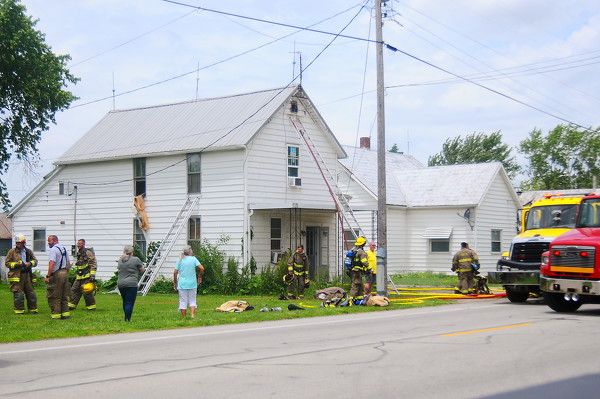Thursday, June 2nd, 2022
The Camera is Running
Under a new law, residents can be monitored
By Erin Gardner
Some area nursing home officials say they are generally in favor of Esther's Law, a nursing home camera law aimed at monitoring a resident's quality of care and preventing elder abuse.
Esther's Law, which took effect in March, was named after Esther Piskor, who was abused and neglected in an Ohio nursing home for the last three years of her life, according to the Ohio Department of Aging.
The law grants nursing home residents and their families the ability to install a camera in resident rooms to monitor the quality of care received in the home. It also prohibits facilities from retaliating against those who elect to do so.
At the same time, some industry leaders question the law's necessity while others declined to comment on the matter.
Gary Horning, vice president of marketing and communications at Otterbein Senior Life, which has facilities in Cridersville and St. Marys, said the organization supports the new law.
"It, in essence, provides (families) that incremental step of both protection and feeling of well-being that their loved one is being well taken care of on those occasions that they can't be there," Horning said. "At the end of the day, we're very much in favor of anything that can allow both the resident and their family members to feel really comfortable with the level of care that is being provided, and to make sure that everything is going as they would expect it to."
According to the law, if a resident has a roommate, the roommate must consent to having a camera in the room. If the roommate does not consent, the nursing home must make reasonable accommodations to the resident requesting video monitoring, such as moving them to a different room.
A facility cannot deny admission or discharge, discriminate or retaliate against a resident because of their decision to install a camera in their room. Facilities also cannot obstruct, tamper with or destroy the device or any recording made from it.
The law stipulates only residents, their representatives, law enforcement and others permitted by the resident may watch or listen to the recording.
He also said the camera is fixed, meaning it has an unadjustable focal length. The camera is also easily visible and signage notifies people they're being recorded.
Horning said families have utilized the law at some of Otterbein's 18 locations in Ohio and Indiana. However, the Cridersville and St. Marys sites have yet to receive requests for cameras, he said.
Horning said there could be a few reasons why more residents and families haven't requested cameras.
"First, Esther's Law is new and any new use of technology takes some time to engage," he said. "But second and just as likely, Otterbein Cridersville and St. Marys both maintain a stellar reputation for resident care and, honestly, a resident's family is part of the care equation - with most visiting regularly and very involved in the care and security program."
Kristen Wynk, executive director at Briarwood Village in Coldwater, said no family or resident has requested cameras at the facility.
"As an advocate of long-term care, I think it's extremely important that we always keep the resident's best interest in mind and also (respect their) safety and their rights at the same time," she said.
Karen Cisco, a Mercer County Council on Aging board member, thinks the law is a good idea.
"We don't know what's going on behind the scenes," she said. "I really don't think that the videos really hurt anything because there again, I've heard of so many things happening to people that, without that camera, they would never know."
Dawn Daugherty, executive director of Mercer County Council on Aging, declined to comment on the law.
Robert Warren, executive director of Auglaize County Council on Aging, said he thinks the law is necessary to keep the public safe and accountable.
Although the law is aimed at ensuring a resident's quality of care and preventing elder abuse, some officials believe elder abuse in the area is limited.
Horning said he believes elder abuse occurs primarily in private residences rather than in nursing homes.
"Those folks are in this nursing profession because they care, because the whole concept is important to them," he said. "It's not just a paycheck like you would get down at Walmart or McDonald's. The elder abuse in an assisted living or nursing home atmosphere… I think is very, very, very rare. I think it would be prevalent in private dwellings where people are just neglected to an extent that they aren't in a nursing home environment."
Wynk said she believes the area is surrounded by supportive families, and facilities have solid staff members who truly have the residents' best interest of in mind and care for them.
Dave Bartlett, administrator at Divine Rehab and Nursing at Shane Hill in Rockford, said he believes the law is beneficial. However, he doesn't think elder abuse is pervasive.
"Obviously, there probably is some form of elder abuse going on, but I don't think it's widespread," he said. "Again, this (law) is a tool to help their loved ones reassure them so they can monitor their family while they are at a skilled nursing facility. I don't think it's widespread to the fact that this was a needed law, but it is what it is."
According to the Ohio Department on Aging, elder abuse can occur physically, sexually, emotionally, financially or through neglect or isolation. Ohio Attorney General Dave Yost in a 2021 statement reported there were 456 cases of patient abuse and neglect from 2019 to 2020 in Ohio. Over the past two years, investigations have brought 106 indictments thus far, according to Yost.
Erin Pettegrew, deputy long-term care ombudsman for Ohio, said cases of elder abuse in Mercer and Auglaize counties are few. Mercer County had one documented elder abuse case in 2021 and one in 2022 so far, he said. There was one case in Auglaize County in 2020, Pettegrew said.
Pettegrew did not indicate where those cases occurred.
According to the National Consumer Voice for Quality Long-Term Care, signs of elder neglect include pressure ulcers, malnutrition, dehydration, poor personal hygiene, isolation, lack of assistive devices, frequent or untreated changes in condition, over- or under-medicating, changes in demeanor, loss of abilities like walking or incontinence and unexplained injures.
"Neglect is often the result of inadequate staffing in a nursing home," according to Consumer Voice. "If there are not enough staff to care for the residents, then care and services are not provided, and mistakes are often made, or accidents occur. Lack of proper training is another factor that can lead to neglect due to care not being properly provided, as well as increased staff errors and accidents."
Those who suspect elder abuse can call a statewide toll-free help line at 1-855-644-6277 or contact their county department of job and family services, according to Ohio Department of Aging.

